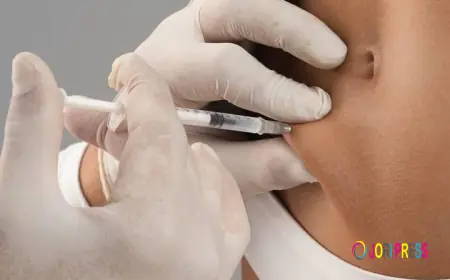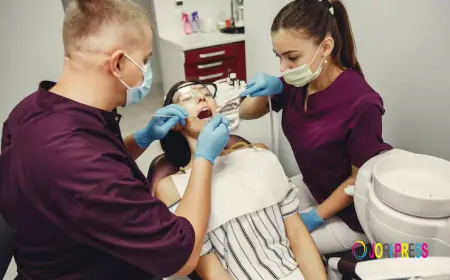The Most Common STDs and How to Test for Them
Get confidential STD tests in Dubai at Royal Clinic. Expert gynecologists provide accurate diagnosis and treatment for sexually transmitted diseases.

Sexually transmitted diseases (STDs) are infections that spread primarily through sexual contact. They are more common than many people realize and can affect anyone who is sexually active, regardless of age or gender. Early detection plays a major role in staying healthy and preventing complications.
Why STD Testing Is Important
STD Checkup Dubai helps identify infections before symptoms appear. Some STDs can go unnoticed for a long time but still be transmitted to others. Regular testing is one of the most effective ways to protect one's health and the health of partners.
Common STDs to Be Aware Of
Chlamydia
Chlamydia is one of the most reported bacterial STDs. It often has no noticeable symptoms, especially in its early stages. When symptoms do appear, they may include unusual discharge or a burning feeling during urination.
Gonorrhea
This bacterial infection is known to affect areas such as the genitals, throat, or rectum. Many individuals may not experience symptoms, but when they do, it can involve irritation, discharge, or discomfort while urinating.
Syphilis
Syphilis develops in stages and may begin with a painless sore. If left undetected, it can progress quietly and affect various systems in the body. Regular testing is essential since the early stages can go unnoticed.
Human Papillomavirus (HPV)
HPV includes several strains, some of which are linked to genital warts, while others may lead to certain cancers. Most infections clear on their own, but some remain in the body. Routine screenings are recommended for certain age groups.
Herpes Simplex Virus (HSV)
HSV is categorized into two types, HSV-1 and HSV-2, and it can cause oral or genital outbreaks. These often appear as blisters or sores, though some individuals carry the virus without symptoms.
HIV (Human Immunodeficiency Virus)
HIV affects the immune system and may not show symptoms for years. It can be managed effectively when detected early. Getting tested is the only way to know for sure.
Trichomoniasis
This is a parasitic infection that often causes itching or unusual discharge. However, many people do not experience noticeable symptoms. Testing helps catch this infection early and allows for prompt treatment.
How STD Testing Works
Swab Tests
Swab tests involve taking a sample from the potentially infected area. This is commonly done for infections like gonorrhea or chlamydia and may be performed orally, vaginally, or rectally.
Urine Tests
Urine samples are typically used to detect bacterial STDs like chlamydia or gonorrhea. It is a non-invasive and convenient option for many individuals.
Blood Tests
A small blood sample can be used to check for infections such as HIV, syphilis, or herpes. These tests are effective in detecting the presence of specific antibodies or antigens.
Physical Examinations
Some infections, like genital warts or herpes, may be identified during a physical exam. Healthcare professionals may inspect the area visually to make a diagnosis.
When to Get Tested
After New Sexual Partners
Getting tested after becoming intimate with a new partner helps ensure both individuals are aware of their status. This supports mutual safety and health.
If Symptoms Are Present
Any unusual changes, such as discomfort, discharge, or sores, should prompt a visit for testing. Early detection helps manage symptoms and prevent spread.
As Part of Routine Screenings
Even without symptoms, routine screenings are recommended for anyone who is sexually active. Regular testing promotes overall sexual wellness.
Preventing the Spread of STDs
While testing is important, prevention strategies can also help reduce the risk of transmission. This includes open conversations about sexual history, consistent use of protection during intercourse, and limiting the number of partners.
Confidentiality in Testing
Testing for STDs is private, and individuals are encouraged to seek services confidently. Confidentiality allows people to make informed decisions about their sexual health without fear of stigma or judgment.
FAQs
What if I have no symptoms? Should I still get tested?
Yes, many STD Screening Dubai do not show symptoms right away. Regular testing is key to identifying infections early and staying protected.
Can STDs go away without testing or treatment?
Most STDs do not go away on their own. Without testing and proper treatment, they can remain in the body and cause complications.
How long does it take to get results?
The time it takes to receive results depends on the type of test. Some tests provide results quickly, while others may take a few days. It's important to follow up and review the results with a healthcare provider.
Is testing uncomfortable?
Many tests are quick and cause minimal discomfort. Blood draws, urine samples, or swabs are generally easy procedures.
Can I test for all STDs at once?
Yes, comprehensive panels are available that test for multiple STDs in a single session. This is a convenient way to check for several infections at once.
How often should someone get tested?
The frequency of testing depends on sexual activity, number of partners, and individual health history. In general, regular testing is encouraged for those who are sexually active.
What happens if a test is positive?
If a test comes back positive, the next step is to discuss the findings with a healthcare professional. They can recommend appropriate treatment and guide on preventing future infections.
Staying Informed and Proactive
Taking charge of sexual health begins with awareness and regular testing. Understanding the most common STDs and how to test for them empowers individuals to protect themselves and others. With the right knowledge and actions, managing sexual wellness becomes a natural and responsible part of overall health.
What's Your Reaction?
 Like
0
Like
0
 Dislike
0
Dislike
0
 Love
0
Love
0
 Funny
0
Funny
0
 Angry
0
Angry
0
 Sad
0
Sad
0
 Wow
0
Wow
0




















































